They say you can’t judge a book by its cover, but for beverage alcohol, labels are supposed to provide everything consumers need to know. This isn’t merely good marketing but is mandated by law.
Both federally and for the states, there are rules on labels for beer, wine, and spirits. These include required elements of a label, such as the “Government Warning” and supplier identification information. There are also restrictions, such as rules prohibiting making health claims and references to how “intoxicating” the alcohol is. There are also more obscure provisions, like the very specific way alcohol content statements should appear and restrictions on using government seals or stamps. To police these provisions, alcohol regulators require suppliers submit their labels for approval before their products can be sold.
All suppliers should be familiar with the TTB Certificate of Label Approval (COLA) process, which is required for almost all alcohol products sold in the United States to verify the product’s label complies with federal law. There are some exceptions—such as beer sold only in its state of production or wines with an ABV of less than 7 percent—but almost everything you see in a liquor store has gotten this imprimatur of the federal government.
Most states also have their own label approval process, which suppliers need to follow when they bring new products into those states. Often enough, the state merely wants a record of what will appear on its stores’ shelves, requiring only a copy of the COLA and a distributor appointment. But there are states that do their own thorough label review.
Getting these label approvals can be a huge hassle for beverage alcohol suppliers. A review by the TTB or a state agency can take several weeks. And if a label doesn’t get first-time approval, it can take many weeks (or more) to fix, severely hampering a go-to-market plan: Just imagine how problematic it would be if a brewer didn’t have approved labels for its Winter Ale come December. As such, both federal and state regulators have sought in recent years to improve this process and remove as many roadblocks as possible.
A few years ago, the TTB vastly improved their COLA process, reducing times for first-time label approvals from up to a couple of months to less than two weeks. This came via a mixture of new software and hiring more reviewers, which was enabled by an additional $5 million in federal appropriations. In addition, the TTB also instituted a wide array of allowable revisions that suppliers can make to their labels without requiring a new COLA; this reduces the backlog of labels needing approval.
Many states have also adopted software services to improve label approval times and reduce the oceans of paperwork they used to receive. For example, states such as Colorado, Louisiana, and most recently, New York, have been able to reduce their approval time from several weeks to just minutes after adopting the Product Registration Online system.
 The use of software has become ubiquitous in so many fields that it can be easy to overlook its value. When it comes to beverage alcohol labels, the positives in reduced time, paperwork, and difficulty are clear. All regulators would do well to seek out the support that technology can bring.
The use of software has become ubiquitous in so many fields that it can be easy to overlook its value. When it comes to beverage alcohol labels, the positives in reduced time, paperwork, and difficulty are clear. All regulators would do well to seek out the support that technology can bring.
Alex Koral is senior regulatory counsel for Sovos ShipCompliant. He actively researches beverage alcohol regulations and market developments to inform development of Sovos’ ShipCompliant product and help educate the industry on compliance issues. Alex has worked with the company since 2015, after receiving his J.D. from the University of Colorado Law School.











